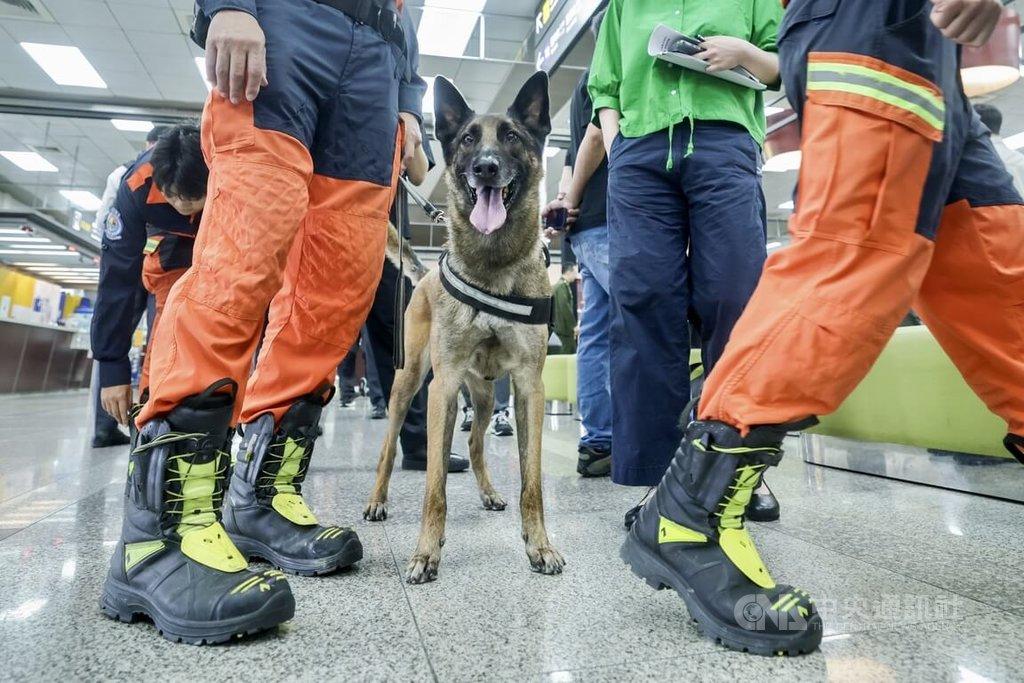Active-duty service dogs are to be provided insurance, with premiums fully subsidized by the Ministry of Agriculture, the ministry told a news conference in Taipei today.
Nan Shan General Insurance Co has launched a specialized insurance policy for active-duty service dogs in public agencies that costs NT$13,374 per dog per year, company general manager Lin I-hsiao(林宜孝) said.
It would cover up to five outpatient visits per year, hospitalization, surgery and funeral costs, Lin said.

Photo: CNA
The policy would be open for enrollment in September, while the Regulations for the Care and Management of Government Working Dogs (政府部門執勤犬照護管理規則) would be amended in January next year, making insurance mandatory, Minister of Agriculture Chen Junne-jih (陳駿季) said.
Coverage would later be expanded to include medical expenses for retired dogs and search-and-rescue dogs, and the government might consider partial subsidies for them, Chen said.
As of March, Taiwan had 292 active-duty service dogs in government agencies, used for search and rescue, drug and disease detection, and assistance in police and military operations, he said.
Despite playing a crucial role in public safety, border inspection, drug enforcement and disaster response, insurers have excluded working dogs from pet insurance as they are not considered “pets,” Chen said.
The most common medical issue for service dogs is heatstroke, and working in disaster zones can often result in respiratory problems, Taiwan Working Dog Association chairperson Kuan Hsin-ling (關心羚) said.
Some dogs even develop cancer and their treatment can be costly, so medical insurance would provide much-needed care in light of public agencies' limited budgets, she said.
Service dogs usually begin working at age two to three and retire after four to seven years of service, Kuan said.
Post-retirement benefits are minimal at present, offering only pet food after their adoption, she said, adding that the government has a responsibility to ensure their health and dignity even after retirement.

The Coast Guard Administration (CGA) yesterday said it had deployed patrol vessels to expel a China Coast Guard ship and a Chinese fishing boat near Pratas Island (Dongsha Island, 東沙群島) in the South China Sea. The China Coast Guard vessel was 28 nautical miles (52km) northeast of Pratas at 6:15am on Thursday, approaching the island’s restricted waters, which extend 24 nautical miles from its shoreline, the CGA’s Dongsha-Nansha Branch said in a statement. The Tainan, a 2,000-tonne cutter, was deployed by the CGA to shadow the Chinese ship, which left the area at 2:39pm on Friday, the statement said. At 6:31pm on Friday,

The Chinese People’s Liberation Army Navy’s (PLAN) third aircraft carrier, the Fujian, would pose a steep challenge to Taiwan’s ability to defend itself against a full-scale invasion, a defense expert said yesterday. Institute of National Defense and Security Research analyst Chieh Chung (揭仲) made the comment hours after the PLAN confirmed the carrier recently passed through the Taiwan Strait to conduct “scientific research tests and training missions” in the South China Sea. China has two carriers in operation — the Liaoning and the Shandong — with the Fujian undergoing sea trials. Although the PLAN needs time to train the Fujian’s air wing and

Taiwanese celebrities Hank Chen (陳漢典) and Lulu Huang (黃路梓茵) announced yesterday that they are planning to marry. Huang announced and posted photos of their engagement to her social media pages yesterday morning, joking that the pair were not just doing marketing for a new show, but “really getting married.” “We’ve decided to spend all of our future happy and hilarious moments together,” she wrote. The announcement, which was later confirmed by the talent agency they share, appeared to come as a surprise even to those around them, with veteran TV host Jacky Wu (吳宗憲) saying he was “totally taken aback” by the news. Huang,

The American Institute in Taiwan (AIT) put Taiwan in danger, Ma Ying-jeou Foundation director Hsiao Hsu-tsen (蕭旭岑) said yesterday, hours after the de facto US embassy said that Beijing had misinterpreted World War II-era documents to isolate Taiwan. The AIT’s comments harmed the Republic of China’s (ROC) national interests and contradicted a part of the “six assurances” stipulating that the US would not change its official position on Taiwan’s sovereignty, Hsiao said. The “six assurances,” which were given by then-US president Ronald Reagan to Taiwan in 1982, say that Washington would not set a date for ending arm sales to Taiwan, consult